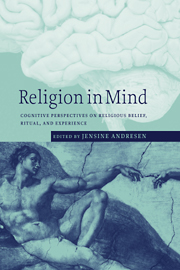Book contents
- Frontmatter
- Contents
- Notes on contributors
- 1 Introduction: towards a cognitive science of religion
- PART I BELIEF ACQUISITION AND THE SPREAD OF RELIGIOUS REPRESENTATIONS
- 2 On what we may believe about beliefs
- 3 Cognition, emotion, and religious experience
- 4 Why gods? A cognitive theory
- PART II QUESTIONING THE “REPRESENTATION” OF RELIGIOUS RITUAL ACTION
- PART III EMBODIED MODELS OF RELIGION
- Index
4 - Why gods? A cognitive theory
Published online by Cambridge University Press: 02 December 2009
- Frontmatter
- Contents
- Notes on contributors
- 1 Introduction: towards a cognitive science of religion
- PART I BELIEF ACQUISITION AND THE SPREAD OF RELIGIOUS REPRESENTATIONS
- 2 On what we may believe about beliefs
- 3 Cognition, emotion, and religious experience
- 4 Why gods? A cognitive theory
- PART II QUESTIONING THE “REPRESENTATION” OF RELIGIOUS RITUAL ACTION
- PART III EMBODIED MODELS OF RELIGION
- Index
Summary
We find human faces in the moon, armies in the clouds; and by a natural propensity … ascribe malice or good-will to every thing, that hurts or pleases us. Hence … trees, mountains and streams are personified, and the inanimate parts of nature acquire sentiment and passion.
David Hume, The Natural History of Religion, p. 29A classical cognitive approach to religion holds that beliefs in gods, modeled on human self-understandings, arise and persist because they provide intelligible and plausible interpretations of the world. Advocates of this approach, however, have not explained convincingly why humans model the world so heavily on themselves rather than on something else. I argue that our tendency to view and treat the world as alive and humanlike – that is, to animate and anthropomorphize it – constitutes a necessary and deeply held cognitive bias. The bias stems from an innate strategy: to interpret ambiguous things and events first as what matters most. What matters most usually is what is alive and especially what is human. We readily see and hear our environments as alive and humanlike because when they actually are, we benefit from such interpretation, and when they are not, we lose little. Consequently gods, demons, and the like are part of a spectrum of humanlike beings we think we discern in the world.
INTERPRETING THE WORLD
In joining cognitive science and religious experience, the authors in this volume largely are viewing religion as a kind of cognition – that is, as a kind of interpretation of the world.
- Type
- Chapter
- Information
- Religion in MindCognitive Perspectives on Religious Belief, Ritual, and Experience, pp. 94 - 112Publisher: Cambridge University PressPrint publication year: 2001
- 14
- Cited by



